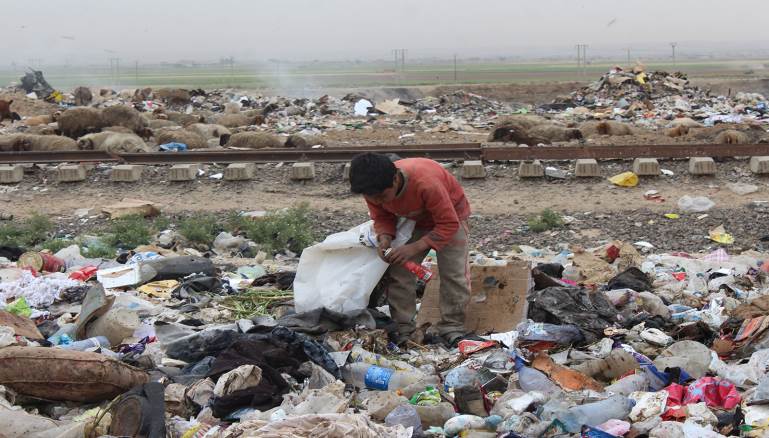Growing hashish, distributing and taking it, as well as abusing Captagon pills, has become a widespread phenomenon among young men and teens in Raqqa, which is now controlled by the Syrian Democratic Forces (SDF), after a destructive and bloody battle with the Islamic State (ISIS).
An aid worker in Raqqa tells Al-Modon, “The pills being abused in Raqqa bear the names Captagon and Lexus.” She adds, “Everyone takes them … even girls … and of course the PYD abuse the pills as well.” She continues,“The source of the pills are dealers from Homs, and their heart is in the camps where the Homs and Hama residents live in Mazraa Yarib, Rabeea, and al-Qahtaniyah.”
At the gate outside the al-Mamoun school in the old city, students and passersby can see a stall selling children’s food — as well as hashish and Lexus pills.
It has become easy to distinguish those abusing pills from their appearance and behavior in Raqqa’s streets. An SDF member who was using the pills, harassed women from the village of Meshlab about a month ago, and when the population began to protest angrily, the SDF shot and wounded a number of them.
Cafes such as Ahla Tilla and Bisan al-Sham, which opened after the SDF took control of Raqqa, have become fixed addresses for smoking and buying hashish mixed with tobacco. A former teacher told Al-Modon: “The clients of these cafeterias go through stages of integrations. They are given argileh for free when they first turn up, and then the person turns into a permanent customer.” She adds that the adolescent drug addicts and Euphrates water vendors gather in the Ahla Tilla cafe, while the employees of the civil council and the aid groups gather in the Bisan al-Sham cafe in the al-Thakana district, which has a separate section for families.
The spread of drugs in Raqqa today coincides with the return of the Shathawiyyet to work as waitresses in these cafes. This is the local name for the women from the town of Shatha in the al-Ghab plains who are from the Murshidi sect. The Shathawiyyet work in restaurants and canteens in Raqqa that serve alcohol, which have been going on since 2009, to attract specific types of customers. The arrival of the Shathawiyyet was a matter of surprise for the conservative Raqqa society before the revolution. Today, it raises eyebrows because of the apparent hostility between the regime and the Kurdish Self-Administration, given the deteriorating economic, security and health situation in Raqqa which is not an attractive place for work.
The spread of hasish and Captagon in Raqqa is overseen by people with connections to the SDF, who are connected to pharmacies or investors in pharmacies, and cafe owners, as promoters and investors at the same time.
A former fighter in the Free Syrian Army from Raqqa told Al-Modon that the growing of hashish was fully monopolized by the Kurdish People’s Protection Units, with most of the growing concentrated in the two areas of Ain al-Arab and Tel Abyad. He added that the militias hid the hashish fields by growing them inside corn. He said: “I saw Captagon pills for the first time when I was in the battle for Raqqa. The Arab groups fighting in the SDF had a share of them, because they were fighting on the frontlines, and I think the Americans knew that.”
It seems that this phenomenon is a symptom of the social fragmentation that is a result of the consequences of the Syrian revolution. The state authorities and its security institutions have collapsed and most Syrian cities and countrysides have fallen from the grip of the central regime, which has led to proliferation of de-facto control and conflicting agendas, and then the cooling and retreat of the revolutionary forces from the start of 2012. Reports and testimonies indicate that the growing of hashish and dealing of Captagon has spread widely, and may not be spontaneous but rather tied to policies from some de-facto forces and warlords, as mechanisms to support and diversify the war economy and take control of the young men from these societies and break up their civil ties.
This article was translated and edited by The Syrian Observer. Responsibility for the information and views set out in this article lies entirely with the author.


